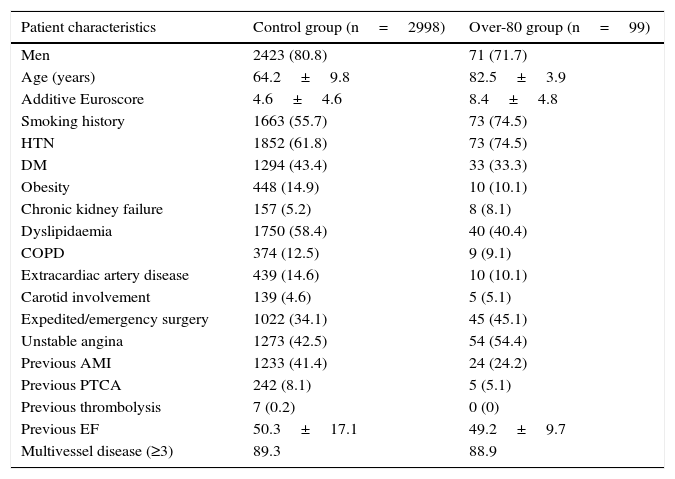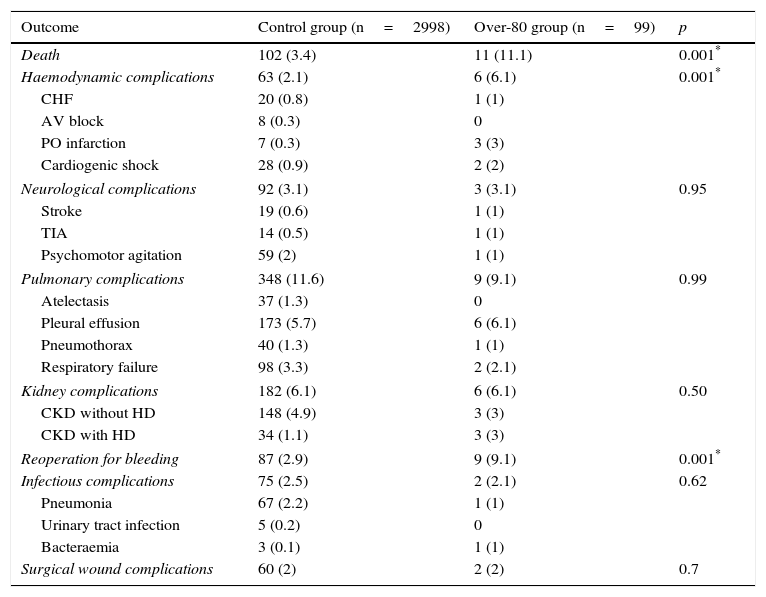We aim to describe our experience in coronary artery bypass graft in elderly patients older than 80 years and assess the associated risk and predictors of mortality in this subgroup.
Material and methodFrom January 1999 to June 2013, 3097 patients underwent consecutive coronary artery bypass graft surgery. Patients aged over 80 years were identified. Multivariate survival analysis using Cox's regression model was performed.
ResultsWe identified 99 patients older than 80 years (80-group; mean age 82±3.5 years) and 2957 younger than 80 years (control group) (mean age 64.2±9.7 years). Additive EuroSCORE was 8.4±4.8 and 4.6±4.6 (p<0.001) in the 80-group vs. control group, respectively. Off-pump coronary artery bypass graft was performed in 79.6 vs. 41.6% (p<0.001) in the 80-group vs. the control group, respectively. There was significantly higher 30 day-mortality in the 80-group, 11.2 vs. 3.3%, respectively (p<0.001). Patients in the 80-group underwent reintervention for bleeding more frequently (9.2 vs. 2.9%; p=0.001) and had a higher incidence of major cardiovascular complications than the control group (6.1 vs. 2.1%; p=0.001). Independent predictors of mortality for the 80-group were: reoperation for bleeding (HR 5.7; 95% CI 1.6–19.5) and cardiovascular complications (HR 3.7; 95% CI 1.1–12.2). The mean follow-up was 6.3±4.2 years for the octogenarian group. The cumulative survival of these patients was 65.7% during the study period.
ConclusionCoronary artery bypass graft is performed preferably in patients over 80 years old under the off-pump procedure. Mortality is higher in this group of patients probably related to a higher incidence of cardiovascular complications and reintervention for bleeding in the immediate postoperative period.
El objetivo de este estudio es describir nuestra experiencia en la cirugía de revascularización coronaria aislada en pacientes mayores de 80 años e identificar los riesgos específicos y predictores de mortalidad precoz.
Material y métodosEntre enero de 1999 y junio de 2013, 3.097 pacientes fueron sometidos a cirugía de revascularización coronaria aislada. Se analizaron los pacientes mayores de 80 años de edad. Se realizó una regresión mutivariante de Cox para predictores de mortalidad.
ResultadosSe identificaron 99 pacientes mayores de 80 años (grupo-80; edad media 82±3,5 años) y 2.957 menores de 80 años (grupo control; edad media 64,2±9,7 años). El EuroSCORE aditivo fue 8,4±4,8 y 4,6±4,6 (p<0,001) en los>80 años vs.<80 años, respectivamente. La cirugía sin CEC se realizó en el 79,6% en el grupo-80 años. La mortalidad a los 30 días en el grupo-80 fue significativamente superior, del 11,2 vs. 3,3% (p<0,001). El grupo-80 se reintervino por sangrado más frecuentemente (9,2 vs. 2,9%; p=0,001) y tuvieron con mayor frecuencia complicaciones cardiovasculares mayores (6,1 vs. 2,1%; p=0,001). Los predictores independientes de mortalidad a 30 días fueron: la reintervención por sangrado (HR 5,7; IC 95% 1,6-19,5) y las complicaciones cardiovasculares mayores (HR 3,7; IC 95% 1,1-12,2). El seguimiento medio del grupo-80 fue de 6,3±4,2 años, con una supervivencia acumulada de estos pacientes del 65,7% durante el periodo de estudio.
ConclusiónLa cirugía de revascularización coronaria aislada se realiza preferentemente en pacientes mayores de 80 años sin CEC. Presentan una mayor incidencia de complicaciones cardiovasculares, reintervenciones por sangrado en el postoperatorio inmediato y una mortalidad más elevada.













